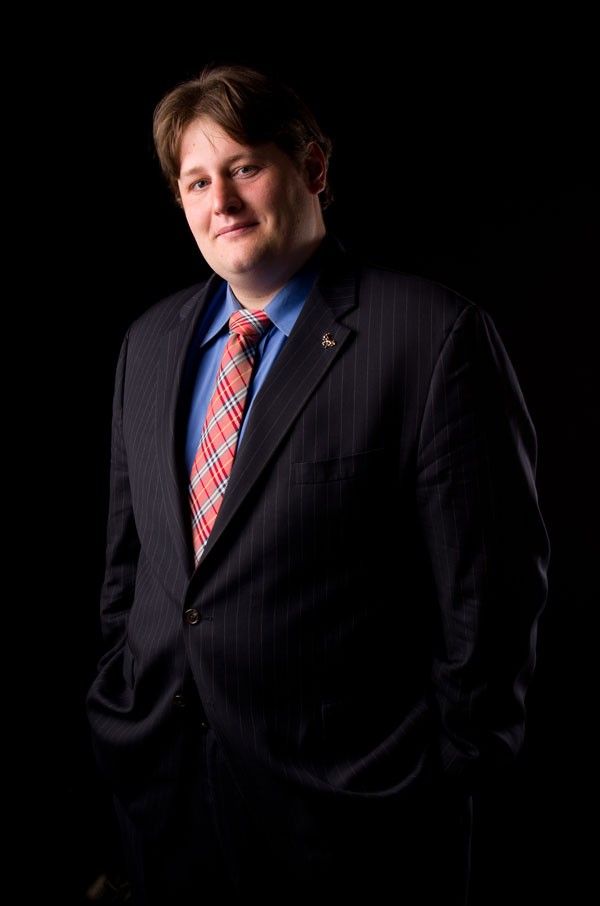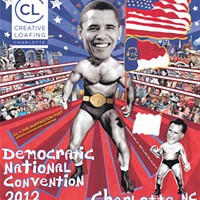Sam Spencer is a burly but energetic political dynamo, always at the forefront of Tar Heel politics. This year, the 27-year-old will get his turn on the national stage.

- (Photo: Jeaumane McIntosh)
As president of the Young Democrats of North Carolina, Spencer has helped usher in an unprecedented number of youth delegates for the upcoming Democratic National Convention. His vocal opposition of Amendment One, which constitutionalized a heterosexual definition of marriage in the state, has him poised to be a key figure in the fight for marriage equality — one of the more contentious Democratic Party platforms — when delegates meet in Charlotte this September.
Spencer might sometimes give off the veneer of a cynical operative, focused on poll numbers and victories, but in reality he is a deeply idealistic activist who entered politics because of his passionate opposition to the Iraq War and heartfelt support of gay rights.
"The first thing that really peaked my interest was a Rolling Stone article in October of 2000 that Al Franken did about George W. Bush," says Spencer, who was a high school sophomore at the time. "I found it both hilarious and terrifying at the same time."
Toward the end of his time at North Mecklenburg High School, the U.S. began combat operations against Iraq. Most students were focused on college applications and making plans for senior week at the beach, but not Spencer.
"The first big major political action I ever took part in was organizing a protest against the Iraq War in Frazier Park in downtown Charlotte," he says. Through that he became familiar with the mundane but necessary aspects of organizing, like sending out press releases and creating a website.
The experience earned him accolades from like-minded peers; it also opened him up to heavy criticism, even hate mail, from neighbors who disapproved. But that first big splash got his feet wet. Soon, he was helping candidates and engaging in party politics.
Spencer lobbied then-Sen. Elizabeth Dole to oppose the 2004 federal marriage amendment, and as a freshman studying political science at Davidson College, he got involved with Erskine Bowles' ill-fated campaign to replace then-Sen. John Edwards.
"That's when I went to my first fundraiser, got involved with the local party for the first time, and that fall went to my first Young Democrats of Mecklenburg County meeting," he says.
Spencer became a fixture on the Charlotte scene, working on local school board races and helping run the county coordinated campaign. But he saw his country and home state struggling with bigger issues. Factory towns across North Carolina slipped further into economic decline, the Bush administration was going to war on a lie, and social conservatives had intensified their crusade against anyone living out a secular lifestyle they deemed depraved.
Spencer took up a different crusade, journeying to wintry Iowa to work for Joe Biden's presidential bid. That campaign did not work out, nor did the Jim Neal for U.S. Senate operation that Spencer returned to focus on in spring 2008.
The Neal venture had been ambitious for Spencer, who traveled around the state to small rural towns with the openly gay candidate. Spencer was responsible for promoting a man who had views on the war and economy with which voters could identify, but whose personal profile didn't go over well in the Bible Belt.
Spencer came out of his experience on the electoral front lines more hardened, but also more determined to do something about the societal barriers that prevented Neal from winning his Democratic senatorial primary. The struggle for gay rights, however, was not a novel concept for Spencer.
In 2004, after watching personal mentors receive unfair treatment because of their sexual orientation throughout his life, Spencer became a straight-ally volunteer at the LGBT Community Center in Charlotte.
"I've had so many great opportunities in life that not everybody gets," Spencer says. "I don't believe in anything other than the promise of equality of opportunity, whether that is civil rights, women's rights, or LGBT rights, and that's why I'm a Democrat."
Spencer moved around a lot as child, from Florida to Texas to New Jersey, before his family settled a few miles up the road from Charlotte, in Davidson. He grew up in a household that made its livelihood from the motorsports industry, as both of his parents worked as journalists covering NASCAR.
After taking time from college to work for campaigns (and managing a movie theater to pay the bills), Spencer graduated from Davidson College in 2010 and now tutors full-time.
But the call to service always beckoned, and after Obama won the 2008 election, North Carolina appointed Spencer as a member of the Electoral College, which casts the formal votes for president and vice president after the election.
"That was a historic moment, realizing a promise of American society that many people did not expect in their lifetimes," Spencer says. "So I asked myself what's next."
The following year, he formed Grassroots Farm Team, a political action committee whose goal was to help people under 40 get elected in local races. All of the candidates the group backed in 2009 won their races.
"That really got me back into the issue of young people in politics," Spencer says. "So in 2011, after being in Young Democrats for seven years, I went to the [Young Democrats of North Carolina] convention in Winston-Salem to take what we were doing with the PAC and empower the next generation of leadership in North Carolina."
As president of YDNC, Spencer has been far from a figurehead and has instead charted an activist course for the organization.
"Literally hours after the General Assembly voted to place Amendment One on the ballot, the YDNC was the first organization to oppose the amendment," he says. "And we didn't just vote to oppose — we did so unanimously."
Then came the issue of delegates to the DNC. Four years ago, the state party set a goal to send at least four ages 36-and-under to this year's convention. But four out of 100 wasn't enough for Spencer.
"We organized a campaign and lobbied the North Carolina Democratic Party hard for more inclusion in the process," Spencer says. "Eventually, we were able to get our delegate goal up to 19."
But even that goal was exceeded, when at the May 19th district conventions, 21 youth delegates were elected by state Democratic Party members.
Then at the June 16th state party convention in Raleigh, nine more were elected. Along with two young members of the DNC committee, the total number of young delegates from North Carolina at the convention will be a historic 32.
"When Mayor Foxx talked about this being the most youth-oriented convention in our history, we heard him loud and clear," Spencer says.
